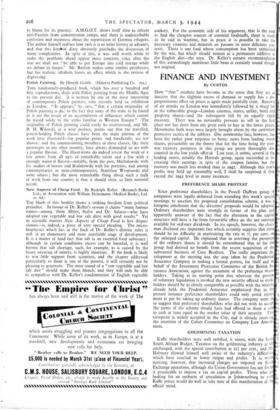New Aspects of Cheap Food. By Rudolph Keller. (Research Books
Ltd., in Association with William Heinemann (Medical Books), Ltd. as. 6c1.)
THE blurb of this booklet shows a striking freedom from political prejudice. In favour of Dr. Keller's system it claims "many famous names—among them Hitler, Stalin and Dr. Salazar—who have adopted raw vegetable and low salt diets with good results." Yet in scientific matters New Aspects of Cheap Food is less dispas- sionate—is, indeed, a piece of very special pleading. The micro- biophysics which lies at the back of Dr. Keller's dietetic rules is still in an elementary and most unreliable stage of development. It is a matter of hard fact that salt is an essential food substance ; although in certain conditions excess can be harmful, it is well known that salt shortage, such, for example, as is caused by the heavy sweating of miners, is highly injurious.- If the book is likely to win little support from scientists, and the chapter addressed particularly to them is one of the poorest, it will certainly not be pleasing to gourmets. The mere sound of a " raw vegetable and low salt diet " should make them blench, and they will only be able to sympathise with Dr. Keller's condemnation of English vegetable cookery. For the economic side of his argument,' that is the need to find the cheapest sources of essential foodstuffs, there is much to be said in wartime, but in peace it is possible • Oa take the necessary vitamins and minerals en passant in more delicious con- texts. There is one food whose consumption has been stimulated by the war, but which should remain as a permanent addition to the English diet—the soya. Dr. Keller's earnest recommendation of this astonishingly nutritious little bean is certainly sound though not original.


























 Previous page
Previous page